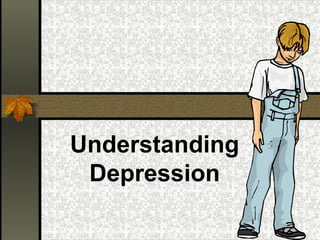
Dr liu depression
- 2. What causes Depression? Family History Having a family members who has depression may increase a person’s risk Imbalances of certain chemicals in the brain may lead to depression
- 3. Major Life Changes Positive or negative events can trigger depression. Examples include the death of a loved one or a promotion. Major Illnesses such as heart attack, stroke or cancer may trigger depression.
- 4. Certain medications used alone or in combination can cause side effects much like the symptoms of depression. Use of Alcohol or other Drugs can lead to or worsen depression. Depression can also occur for no apparent reason!
- 5. Symptoms of Depression Vary from person to person 2 key signs are loss of interest in things you like to do and sadness or irritability
- 6. Additional Signs include: Changes in feelings which may include: Feeling empty Inability to enjoy anything Hopelessness Loss of sexual desire Loss of warm feelings for family or friends Feelings of self blame or guilt Loss of self esteem Inexplicable crying spells, sadness or irritability
- 7. Changes in behavior and attitude These may include: General slowing down Neglect of responsibilities and appearance Poor memory Inability to concentrate Suicidal thoughts, feelings or behaviors Difficulty making decisions
- 8. Physical Complaints These may include: Sleep disturbances such as early morning waking, sleeping too much or insomnia Lack of energy Loss of appetite Weight loss or gain Unexplained headaches or backaches Stomachaches, indigestion or changes in bowl habits
- 9. Common Types of Depression Major Depression Dysthymia Bipolar Disorder Seasonal Affective Disorder (SAD)
- 10. Major Depression This type causes symptoms that may: Begin suddenly, possibly triggered by a loss, crisis or change Interfere with normal functioning Continue for months or years It is possible for a person to have only one episode of major depression. It is more common for episodes to be long lasting or to occur several times during a person’s life
- 11. Dysthymia People with this illness are mildly depressed for years. They function fairly well on a daily basis but their relationships suffer over time.
- 12. Bipolar Disorder People with this type of illness change back and forth between periods of depression and periods of mania (an extreme high). Symptoms of mania may include: Less need for sleep Overconfidence Racing thoughts Reckless behavior Increased energy Mood changes are usually gradual, but can be sudden
- 13. Season Affective Disorder This is a depression that results from changes in the season. Most cases begin in the fall or winter, or when there is a decrease in sunlight.
- 14. Professional treatment is necessary for all these types of depression.
- 15. Treatment for Depression Medication Antidepressantscan help ease the symptoms of depression and return a person to normal functioning. Antidepressants are not habit forming.
- 16. Psychotherapy This can help many depressed people understand themselves and cope with their problems. For example: Interpersonal therapy works to change relationships that affect depression Cognitive-behavioral therapy helps people change negative thinking and behavior patterns
- 17. If you or someone you know has symptoms of depression… Take Action!
- 18. See a doctor for a complete check up. Go to the counseling center and talk to a counselor. Talk things over with a friend, family member or a residential life staff member.
- 19. Don’t expect too much of yourself Take a break Get some exercise Avoid extra stress and big changes
- 20. Things to do Reduce or eliminate the use of alcohol or drugs Exercise or engage in some form of physical activity Eat a proper, well-balanced diet
- 21. Obtain an adequate amount of sleep Seek emotional support from family and friends Focus on positive aspects of your life Pace yourself, modify your schedule, and set realistic goals
- 22. Things to Avoid Don’t make long-term commitments or important decisions unless necessary Don’t assume things are hopeless Don’t engage in “emotional reasoning” (i.e.: because I feel awful, my life is terrible) Don’t assume responsibility for events which are outside of your control Don’t avoid treatment as a way of coping
- 23. Intervening with a depressed friend Be empathetic and understanding Don’t try to “cheer up” a depressed person Avoid critical or shaming statements Challenge expressions of hopelessness Empathize with feelings of sadness, grief, anger and frustration
- 24. Helping a depressed friend… Don’t argue about how bad things are Don’t insist that depression or sadness are the wrong feelings to be experiencing Don’t become angry even though your efforts may be resisted or rejected
- 25. Helping a depressed friend… Advocate for their recovery from depression Emphasize that depression is treatable Seek consultation Encourage them to seek help, go with them to the counseling center Be supportive of counselor or doctor suggestions
